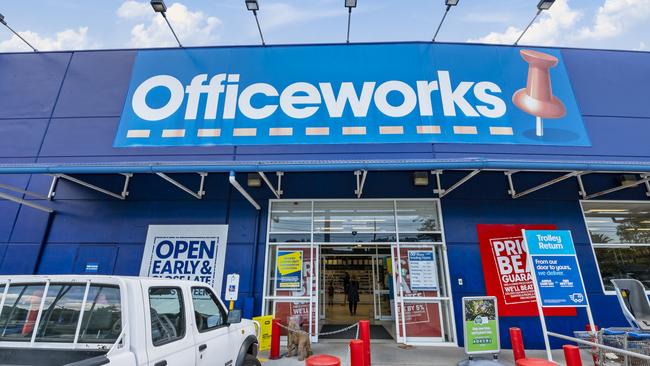Wesfarmers CEO Rob Scott says Bunnings will resist passing on rising timber prices to customers
Wesfarmers says pricing pressure across a range of commodities such as timber and cotton as well as higher shipping costs is now being felt across Bunnings and Kmart.

Wesfarmers boss Rob Scott is pledging Bunnings will heavily resist passing on rising timber prices to customers to protect its brand equity of being a low cost retailer as the national hardware chain and its stablemates such as Kmart and Target absorb pricing pressures from lumber and cotton to shipping containers.
While Wesfarmers, like many other companies in Australia, is facing steeper shipping and shipping container costs which threatens to eat away at margins, he particularly called out lumber as a major input for the conglomerate’s Bunnings chain that was ratcheting higher.
“Lumber prices have gone up and there has been constraints there around supply, we have seen pricing pressure, similarly containing shipping is another area where there has been strong increases in pricing and there’s also been some increases in other raw material prices, cotton and other categories, and I think what is important to note across all these areas the whole market is facing these cost pressures,” Mr Scott told the Macquarie Australia Conference.
A number of chief executives across a patchwork of industries have testified recently to higher input prices now creeping in to their supply chains, with Kmart boss Ian Bailey calling out shipping containers and kogan.com founder Ruslan Kogan warning of elevated prices for items such as LCD screens and tech devices.
The housing boom has created an environment that is now triggering shortages for key construction components and especially timber. On Wednesday latest sector figures revealed that building approvals leapt by 17 per cent in March to levels not seen since 2017, after a 60 per cent spike in apartment approvals complimented another slight lift in stand-alone houses.
The Australian Bureau of Statistics said that monthly total dwelling approvals jumped to 23,176, or 47 per cent above levels recorded in March 2020.
Industry sources told The Australian the rise in timber and lumber prices in Australia hasn’t been as accelerated as in the US where lumber prices have skyrocketed more than 400 per cent, but since November local lumber costs are up at least 20 per cent and imported lumber up 60 per cent.
But Mr Scott moved to calm investors and analysts listening in to the Macquarie investment conference that Wesfarmers would do whatever it takes to maintain Bunnings as well as its other retailer brands credentials of offering low prices to shoppers.
“The way we think about this is not just simply supply costs are going up, how much do we need to increase our price to offset that,” he said.
“That is not the way we think about it, we think about it far more holistically.
“And that is certainly what Bunnings is trying to do with lumber, they are trying to resist the pressure to just keep on increasing prices because in times like this we want to deliver even better value credentials with our customers.
“When cost prices go up the Wesfarmers business will do everything they can to keep our prices down because that’s what our customers depend on us for.”
Bunnings general manager for merchandise, Toby Watson, told The Australian the hardware giant had seen “unprecedented demand for timber products” for a number of months now due to Australians spending more time at home and the incentives for new home builds and renovations.
“This is creating a challenge for the entire industry with demand particularly strong for structural timber,” Mr Watson said.
“We’re working with our suppliers and trade customers to forecast demand and plan earlier in the build process so we have additional time to manage orders as best as possible.” It is believed some price increases have already been passed on to shoppers.
Mr Scott said Wesfarmers’ businesses like discount department store Kmart could use its size and buying power to negotiate better shipping terms and prices.
Timber and lumber prices are proving an acute problem for the hardware and construction industry as limited supply combined with a massive lift in demand - as people renovate their homes during COVID-19 and new homes are built - generates huge leaps in costs.
Mike Barry, the chairman of Natbuild, the nation’s second biggest independent timber group, told The Australian prices in Australia haven’t increased to the same extent as 400 per cent plus rises in the US but that since November pricing pressure in the Australian market has been evident.
“The significant demand from new buildings and renovations has just skyrocketed and that is a global phenomenon, and the consequence is that we have not had the same supply of imported material,” Mr Barry said.
“Towards the end of last year is where we started to feel the price effects.
“Our intelligence is everybody is feeling the same supply pressure here, and same supply disruptions, and our intelligence also says that the price increases are flowing through fairly consistently across the market.”
Meanwhile, at the Macquarie conference Mr Scott said he doesn’t believe the conglomerate has “missed many opportunities” to make acquisitions last year when global equity markets dived in the wake of the first wave of the COVID-19 pandemic.
Wesfarmers has up to $10bn in balance sheet firepower it could throw at an acquisition.
But Mr Scott said Wesfarmers wasn’t in the game of private equity or funds management and wouldn’t leap on weakening share prices to buy stakes in companies, and had just as many exciting and lucrative opportunities to invest in its own portfolio of businesses that could deliver superior returns.
“Reflecting back on the last year I wouldn’t necessarily say we have missed many opportunities, I think what is important to understand is that Wesfarmers isn’t a private equity firm and we are not a fund manager, so if you see a price dip and an opportunity to buy on a dip that is not really what we are about,” Mr Scott told the Macquarie Australia Conference on Wednesday.
“There may be money for some people to make but we are all about investing and building businesses for the long term, that is where we have capabilities, that’s where we have been able to deliver value for our shareholders.
“So I think it is important not to get too carried away to speculate or be or be opportunistic with short term moves in share prices.”
Mr Scott said there were perhaps better investment opportunities within its existing portfolio of businesses.
“I feel that there is a high degree of opportunity and optionality to continue to invest in our businesses, to invest even more in our digital and data capabilities, to invest in adjacent areas.
“These are areas that might not be huge licks of capital but they are areas where we are excited about the growth opportunities and the returns to our shareholders.”

Wesfarmers is also continuing to invest on improving online platforms for its key retail businesses, with hardware giant Bunnings enhancing its website.
The conglomerate has brought in around 400 digital and data analysis staff in recent years and Mr Scott said he expected this trend to continue as these area became more crucial.
He flagged more information on Wesfarmers’ digital and data strategy when the conglomerate holds its strategy day on June 3.
Mr Scott said Wesfarmers was supporting staff in India and Bangladesh amid the latest deadly COVID-19 wave, while the conglomerate was also investigating ways to provide oxygen to alleviate shortages.




To join the conversation, please log in. Don't have an account? Register
Join the conversation, you are commenting as Logout